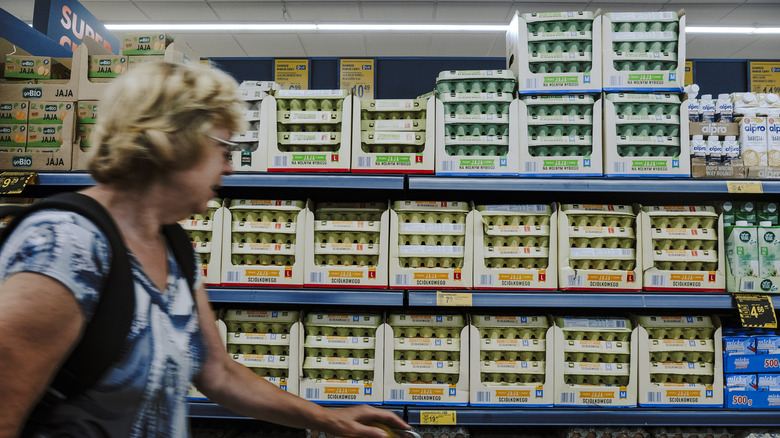Why Eggs Aren't Always Washed Outside Of The US
Anyone who has explored a grocery store outside of the United States likely came across a few surprising differences in how food is displayed and sold. The most notable might be walking through the aisles of a store and discovering cartons of eggs at room temperature on the shelves, rather than behind a door in the refrigerated section.
This dramatic difference stems from the fact that in the United States eggs are required to be washed before finding their way to supermarkets whereas other countries choose to not wash fresh eggs before being sold. Surprisingly, both approaches are safe and effective ways to bring eggs to markets. It all comes down to a thin protective coating on eggs.
The most important safety concern when selling, cooking, and consuming eggs is avoiding salmonella contamination. Surprisingly, both washed and unwashed eggs offer protection in different ways from this unwanted bacteria. While we may be used to purchasing washed and chilled eggs in the United States, rest assured that unwashed eggs sold at room temperature in other countries are also safe to buy.
Unwashed eggs have a protective layer
When eggs are laid, they are naturally covered with a very thin protective film called the cuticle. This thin coating keeps the eggs safe from harmful bacteria, and therefore the eggs don't need to be refrigerated to stay fresh. However, the moment this film is washed off, along with any dirt, feathers, or other debris from the farm, the surface of the egg becomes porous and thus vulnerable to salmonella infection.
One of the reasons eggs aren't typically washed outside the US is because of the needs of the supply chain. Traditionally, the transportation methods from the farms to the distributors, and finally to grocery stores weren't refrigerated. Therefore it is safest to keep the protective layer on the eggs by not washing them. That's the same reason why farmers market eggs aren't refrigerated.
In the United States, it has been a requirement since 1970 for all egg producers to wash their eggs. Quickly after an egg is laid, it is immediately processed through a machine that leaves them perfectly clean but also washes away the natural protective coating. Therefore, they must then be immediately refrigerated and kept chilled throughout the entire process until they are used in your home. Using this method, they will be fresh and safe for up to 50 days. If you want your eggs to last as long as possible in the fridge, you can even store eggs upside down for longer-lasting freshness.
Different approaches to egg safety
The health and safety of the consumer is of utmost importance when it comes to the decision to either wash fresh eggs or leave them unwashed. Salmonella can enter the egg either from the outside through the shell, or the infection can start inside the chicken's ovaries and thus contaminate the yolk even before the egg is laid.
In some countries where the eggs are not washed, the hens are vaccinated against salmonella to help prevent any infection from the very start. The United States does not require this protocol but does require the eggs to be washed.
Since the United States approaches this salmonella safety issue by washing and then refrigerating the eggs we purchase in the grocery store, American consumers have been conditioned to expect very clean-looking eggs upon opening up the carton. We would be quite shocked if the eggs still showed any signs of dirt (or, even worse, actual feathers) from the farm, and we would presume they weren't safe to eat. Despite this, British eggs, for example, are safe for most people to eat even when the egg is raw. Even so, both approaches to safety result in eggs that are safe for consumers to prepare and enjoy at home.



